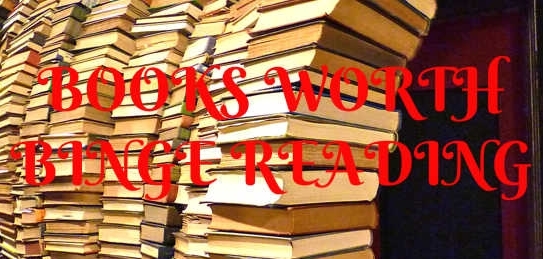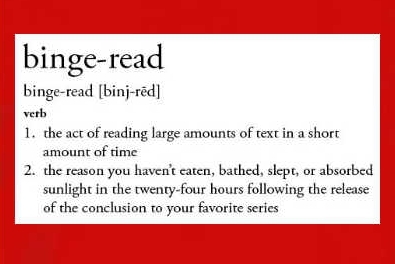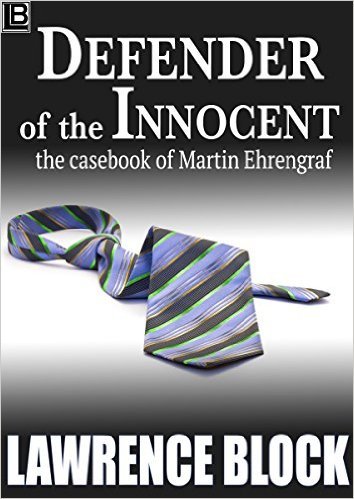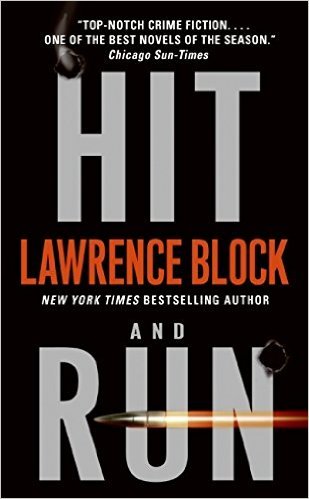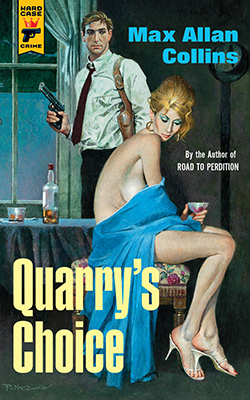Binge watching television shows is a relatively new phenomenon compared to binge reading. Like many before, a reader who discovers Sherlock Holmes for the first time is still apt to binge read their way through most of the Sherlockian canon before coming up for air.
My first experience with binge reading came with John D. MacDonald's Travis McGee novels. Discovering a copy of The Deep Blue Good-By on a used bookstall in London, I didn't interrupt the flow of the self-proclaimed beach bum and knight errant's adventures until sixteen books later with The Dreadful Lemon Sky, the latest entry in the series at the time. Travis McGee embodied the best qualities of Magnum, Rockford, Bond, and Robin Hood, with some cool samurai-style philosophizing and rueful self-awareness added in. I was more than ready to trade in my enduring fascination with Napoleon Solo and become Travis McGee instead.
Over the years, I've indulged myself in other binge reads, including the books of Dick Francis, Ian Fleming, Robert Parker, David Gemmel, James Herriott, Peter Robinson, and lesser known authors such as Gerald Hammond and Rebecca Shaw. Each time, I would read through their output, usually in a specific series, until I caught up with their current novel.
For me binge reading is a joy. To spend consistent time in company of one specific group of characters, or one author's voice, is to spend quality time with good friends in a world far removed from the stresses of daily life. It is escapism at its purist.
Over the years, there have been times I've also engaged in retro-binge reading - rereading a favorite series of books in their correct order. I've done this on more than one occasion with both Dick Francis and Robert B. Parker, and each time has been as satisfying as the first.
There are a few books I make a point of reading every couple of years. Maugham's The Razor's Edge, Conrad's Lord Jim, The Power of One by Bryce Courtenay, and both Round the Bend and Trustee from the Toolroom by Nevil Shute are all old fashioned, leisurely paced, and mannered by today's standards, but each still engages me with the power and ideas between their covers. However, the re-reading of these standalones is a different experience to binge reading or re-binging an entire series.
This year, I've been caught again in a binge reading frenzy. I've been a fan of Lawrence Block since I discovered Sins of the Father, his first Matt Scudder novel, as a new paperback original in 1976. I've stayed with the Scudder series over the years as well as branching out to sample many other novels in Block's prodigious output.
While I truly admire Block as a novelist (and often give the collections of his Writer's Digest columns as gifts to beginning writer friends), I am even more impressed with his mastery of the short story form. Recently, I picked up his new collection, Defender of the Innocent: The Casebook of Martin Ehrengraf featuring the tales of the dapper lawyer of the title as he cleverly - often brutally - ensures the innocence of his clients. All for a very large fee, of course.
I'd read a number of the Ehrengraf stories before, but it was a delight to feast on them again and to discover a couple of new tasty morsels within the collection. However, to stay with the food metaphor, I was still hungry when Ehrengraf twisted his last twist and freed his last client.
Wanting more in the same vein, I pulled up the first of Block's Keller books on to my Kindle from where it had been waiting patiently in the cloud. Next thing you know, I was enjoying myself immensely re-binging my way through the four episodic Keller novels, Hit Man (1998), Hit List (2000), Hit Parade (2006) and Hit Me (2013), and the one full-length Keller novel, Hit and Run (2008).
The early stories featuring Keller, an amoral yet strangely endearing hitman, originally appeared in Playboy magazine in the 1990s. The stories gradually evolved and deepened from simply clever tales of calculated murder for a price, to engage the reader with a character who is both chilling and yet all too human - a man affected by events - such as 911 - and the personal crisis we all face.
When the first stories were originally collected, Block made an effort to link them in order of their appearance and did a seamless job of tying them all together so the final product became far more than just the sum of the parts. As he wrote more Keller stories, Block continued to link them in a manner that makes reading them in order again very satisfying.
As a reader and a writer, I find Block's balancing act within these tales to be fascinating. While Keller displays many attributes of a sociopath, he doesn't fit comfortably into the space within that label. He even examines himself in one story to see if the sociopath shoe fits, and it really doesn't. He is something, almost indescribably, more. Somehow, he is who each individual reader would be if they were an amoral hitman. How Block brilliantly pulls this off is beyond me even as I reread these tales watching and dissecting Block's craft closely.
As I write this column, my virtual bookmark is near the end of the last Keller collection, Hit Me, which continues to expand Keller's world of stamps and murder, and continues Block's mastery of short, connected, tales. As a result, I now find myself wondering what it is about anti-heroes that holds an enduring fascination for readers.
Perhaps it's time for some more research by re-bingeing with Max Alan Collin's Quarry novels - since several new Quarry novels have been published by Hard Case Crime in the past few years - or maybe Richard Stark's (Donald Westlake's) hard bitten Parker novels. Decisions, decisions...
ABOUT THE WRITER: Novelist, screenwriter, and television personality, Paul Bishop spent 35 years with the Los Angeles Police Department, where he was twice honored as Detective of the Year. He continues to work privately as an expert in deception and interrogation. His fifteen novels include five in his LAPD Homicide Detective Fey Croaker series. His latest novel, Lie Catchers, begins a new series featuring LAPD interrogators Ray Pagan and Calamity Jane Randall.
WEBSITE TWITTER FACEBOOK AMAZON
